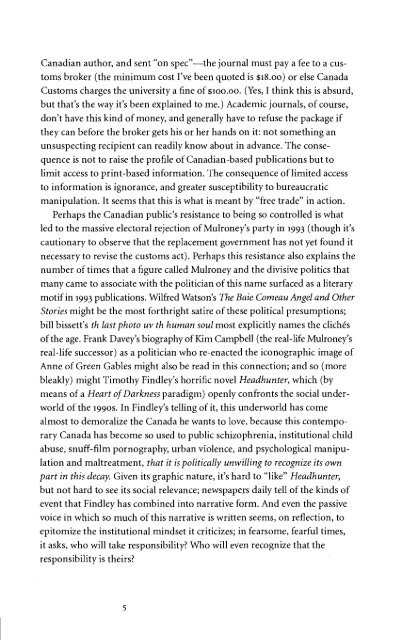The Carpathians - University of British Columbia
The Carpathians - University of British Columbia
The Carpathians - University of British Columbia
Create successful ePaper yourself
Turn your PDF publications into a flip-book with our unique Google optimized e-Paper software.
Canadian author, and sent "on spec"—the journal must pay a fee to a customs<br />
broker (the minimum cost I've been quoted is $18.00) or else Canada<br />
Customs charges the university a fine <strong>of</strong> $100.00. (Yes, I think this is absurd,<br />
but that's the way it's been explained to me.) Academic journals, <strong>of</strong> course,<br />
don't have this kind <strong>of</strong> money, and generally have to refuse the package if<br />
they can before the broker gets his or her hands on it: not something an<br />
unsuspecting recipient can readily know about in advance. <strong>The</strong> consequence<br />
is not to raise the pr<strong>of</strong>ile <strong>of</strong> Canadian-based publications but to<br />
limit access to print-based information. <strong>The</strong> consequence <strong>of</strong> limited access<br />
to information is ignorance, and greater susceptibility to bureaucratic<br />
manipulation. It seems that this is what is meant by "free trade" in action.<br />
Perhaps the Canadian public's resistance to being so controlled is what<br />
led to the massive electoral rejection <strong>of</strong> Mulroney's party in 1993 (though it's<br />
cautionary to observe that the replacement government has not yet found it<br />
necessary to revise the customs act). Perhaps this resistance also explains the<br />
number <strong>of</strong> times that a figure called Mulroney and the divisive politics that<br />
many came to associate with the politician <strong>of</strong> this name surfaced as a literary<br />
motif in 1993 publications. Wilfred Watson's <strong>The</strong> Baie Comeau Angel and Other<br />
Stories might be the most forthright satire <strong>of</strong> these political presumptions;<br />
bill bissett's th last photo uv th human sow/most explicitly names the clichés<br />
<strong>of</strong> the age. Frank Davey's biography <strong>of</strong> Kim Campbell (the real-life Mulroney's<br />
real-life successor) as a politician who re-enacted the iconographie image <strong>of</strong><br />
Anne <strong>of</strong> Green Gables might also be read in this connection; and so (more<br />
bleakly) might Timothy Findley's horrific novel Headhunter, which (by<br />
means <strong>of</strong> a Heart <strong>of</strong> Darkness paradigm) openly confronts the social underworld<br />
<strong>of</strong> the 1990s. In Findley's telling <strong>of</strong> it, this underworld has come<br />
almost to demoralize the Canada he wants to love, because this contemporary<br />
Canada has become so used to public schizophrenia, institutional child<br />
abuse, snuff-film pornography, urban violence, and psychological manipulation<br />
and maltreatment, that it is politically unwilling to recognize its own<br />
part in this decay. Given its graphic nature, it's hard to "like" Headhunter,<br />
but not hard to see its social relevance; newspapers daily tell <strong>of</strong> the kinds <strong>of</strong><br />
event that Findley has combined into narrative form. And even the passive<br />
voice in which so much <strong>of</strong> this narrative is written seems, on reflection, to<br />
epitomize the institutional mindset it criticizes; in fearsome, fearful times,<br />
it asks, who will take responsibility? Who will even recognize that the<br />
responsibility is theirs?

















